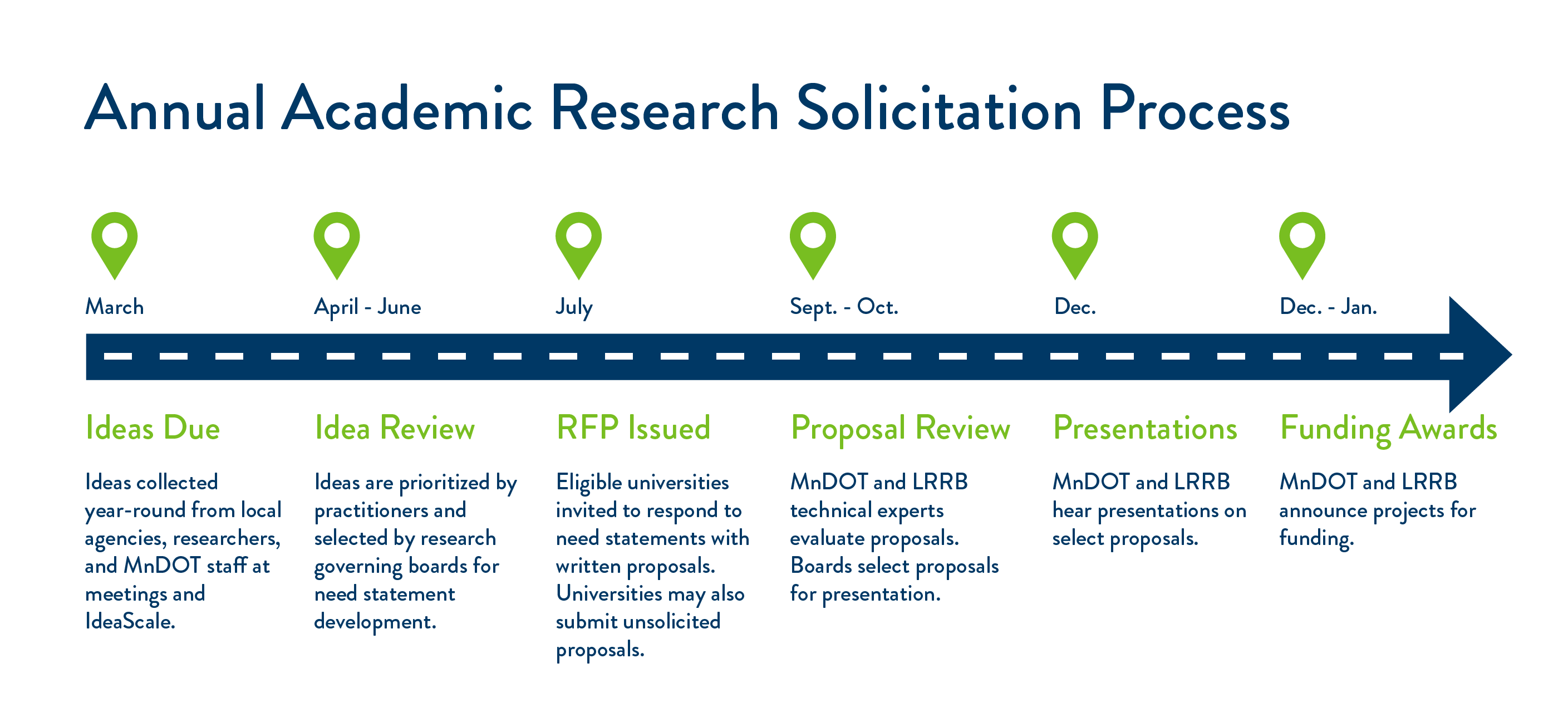Academic research solicitation
The timeline below describes our annual academic research solicitation process from idea development to project funding.

Minnesota transportation practitioners submit research project ideas to the Research & Innovation Office via the Ideascale website or at a MnDOT State Aid pre-screening meeting (cities and counties-only). Read more about this process.
Members of the MnDOT Research Steering Committee and Local Road Research Board (LRRB) review and select ideas to promote for the academic research requests for proposal (RFP). Research & Innovation staff work with the idea-submitters to complete a MnDOT need statement or LRRB need statement with a MnDOT, county or city champion.
MnDOT librarians develop literature searches to help determine any relevant previous research on a proposed topic and avoid duplication of research. The search results include links to full-text materials and citations for materials which are not publicly available online in full text. It will be up to the principal investigator to select or add references that meet their needs for their proposal.
Dates
- Ideas due: April 1, 2025
- Idea selection: April 2 - May 28, 2025
MnDOT and the Local Road Research Board solicit academic research proposals in July. (Multistate pooled fund requests have their own timing; see SP&R funding requests for information.) Need statements identifying research topics in Minnesota for the current year will be posted on the MnDOT website. Qualified universities and MnROAD are invited to submit proposals based on the research need statements with a breakdown of the tasks, costs, deliverables, and schedule. A researcher may also submit an unsolicited proposal along with a letter or email of support from a public agency champion willing to serve in the role of technical liaison for the project.
Following an evaluation by the project champions, the MnDOT Research Steering Committee and the LRRB review and select proposals for presentation. If a need statement receives multiple proposals, they are reviewed and compared using the criteria in the Multiple proposal review form (Word). For more details and a list of eligible universities, see Annual request for proposals.
Proposal template and instructions
- University of Minnesota researchers:
- CTS researchers website (login required)
- All other universities:
Dates
- Request for proposal opens: July 31, 2025
- Proposals due: Sept. 9, 2025
- Proposal review: Sept. 10 – Nov. 3, 2025
You may be asked to present your research proposal to one or both governing boards, the Local Road Research Board and/or the Research Steering Committee, typically in December. If you are, you will be emailed detailed instructions. In general, your presentation will be 10-minutes.
Your presentation should include:
- Names of the research team, affiliation and roles
- Description of the research problem or question the proposal is addressing
- Description of the goal(s) or what you intend to achieve with the research
- Anticipated project benefits and how they might be measured
- Description of the proposed method
- Overall project duration and budget
Avoid including detailed descriptions of tasks, budgets, etc. There is no need to address your qualifications, past projects or the literature search unless you are asked about them.
Funding awards are announced in late December. MnDOT and the LRRB can also fund projects off-cycle as needed.
Dates
- MnDOT meeting: Dec. 8, 2025
- LRRB meeting: Dec. 3-4, 2025
Technical advisory panels (TAPs) are formed to guide the development of work plans and oversee future work. Learn more about TAP member roles and responsibilities (PDF).
There are several types of work plans. The one you use will depend on your institution and the nature of your research.
Work plan templates
- University research work plan template (Word) and University research plan instructions (PDF) - Most commonly used
- Consultant work plan (Word)
- Materials lab work plan (Word)
- Multistate pooled fund research
Dates
- Work plan development: Jan. 1 – March 31, 2026
- Contract development: April 1 – June 30, 2026
- Contracts signed by: July 1, 2026
